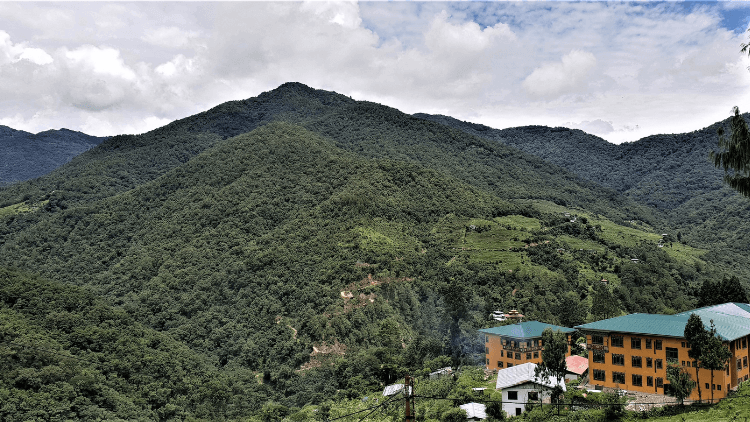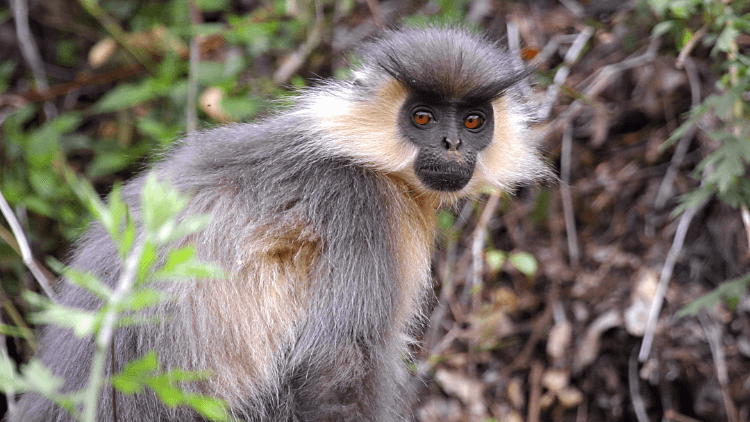
Nestled deep in the heart of the Himalayas, Bhutan captivates visitors with its breathtaking landscapes, lush forests, and unspoiled natural beauty. Renowned for its commitment to environmental conservation, Bhutan has become a shining example of a sustainable tourism destination.
Also known as Druk Yul or The Land of Thunder Dragon, Bhutan shines as a beacon of conservation, boasting a rich tapestry of global biodiversity. National Biodiversity Centre's latest status report of 2022 reveals remarkable statistics about the country's natural wealth. With an impressive 70.77% of its total land covered by forests and about 52 per cent designated as protected areas and biological corridors, Bhutan stands as a haven for biodiversity. Within its borders, an astounding 11,248 species of flora and fauna flourish, including 4,978 species of vascular plants, 3,511 insects, 129 mammals, 736 birds, 125 fishes, and 158 amphibians and reptiles. Furthermore, the country's diverse altitudes, ranging from 200 to 7,600 meters above sea level, have unveiled a treasure trove of over 300 species of medicinal plants.

A Jewel of Biodiversity:
Bhutan's natural environment is a treasure trove of biodiversity. The country's diverse topography, ranging from snowy mountain peaks to verdant valleys, hosts an impressive array of flora and fauna. With approximately 70.77% of its land under forest cover and an extensive network of protected areas, Bhutan safeguards its natural habitats, serving as a global biodiversity hotspot. The country's commitment to preserving its rich ecosystem creates a captivating experience for tourists, providing opportunities for nature-based activities such as hiking, wildlife spotting, and birdwatching.
Conservation as a National Priority:
Bhutan's dedication to environmental preservation is deeply ingrained in its national identity. The country follows a holistic approach to development, guided by the philosophy of Gross National Happiness, which emphasizes the well-being of both people and the environment. The country has set ambitious conservation goals, aiming to maintain at least 60% forest cover for all time. This commitment is reflected in the establishment of protected areas, such as national parks and wildlife sanctuaries, which safeguard endangered species like the elusive snow leopard and the majestic Bengal tiger.

Sustainable Tourism Practices:
Bhutan's approach to tourism is rooted in sustainability, prioritizing the protection of its natural environment and cultural heritage. The far-sighted policy of ‘High-Value, Low-Volume’ tourism ensures that tourism remains environmentally friendly and economically beneficial to local communities. The revenue generated from tourism is reinvested in conservation efforts and community development projects, empowering local residents and reducing dependence on unsustainable practices.
Experiential and Cultural Tourism:
Bhutan offers visitors an immersive and authentic cultural experience. The country's traditional festivals, known as "tshechus," showcase vibrant dances, colourful costumes, and ancient rituals, providing insight into Bhutan's rich cultural heritage. Tourists can engage with local communities through village homestays, supporting rural livelihoods and gaining a deeper understanding of traditional Bhutanese life. Additionally, eco-friendly accommodations, such as eco-lodges and farm stays, promote sustainable practices and allow tourists to experience the serenity of Bhutan's natural surroundings.

Responsible Adventure and Ecotourism:
Bhutan's natural environment provides a playground for responsible adventure and ecotourism. The country offers a wide range of activities, including trekking, mountain biking, and river rafting, all conducted with a strong emphasis on minimizing environmental impact. Tour operators and guides adhere to strict guidelines, ensuring that tourists leave no trace and respect the delicate ecosystems they encounter. Sustainable adventure tourism not only allows visitors to immerse themselves in Bhutan's pristine nature but also contributes to conservation efforts through awareness and financial support.
Bhutan's natural environment is the foundation of its remarkable tourism industry, which showcases the country's commitment to sustainability and preservation. With its awe-inspiring landscapes, thriving biodiversity, and conscientious approach to tourism, Bhutan sets an exemplary model for the world. By protecting and cherishing its natural treasures, Bhutan ensures that future generations can also marvel at the country's pristine beauty while enjoying a responsible and sustainable travel experience.